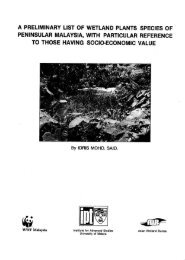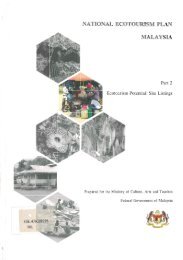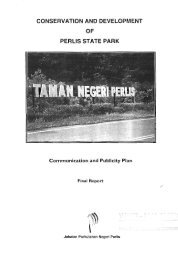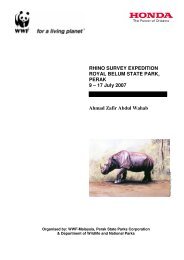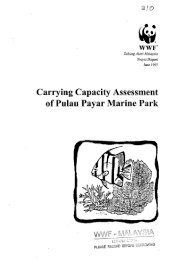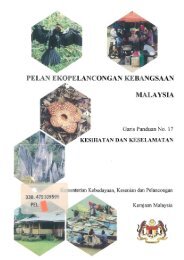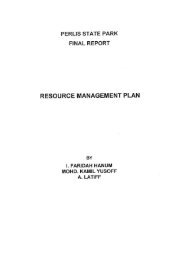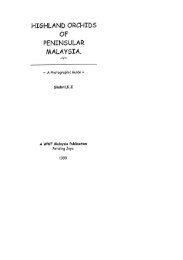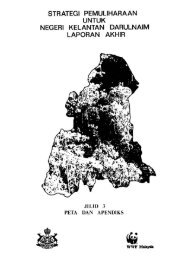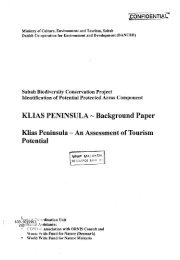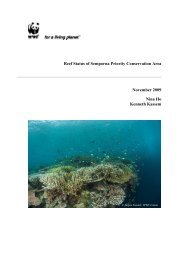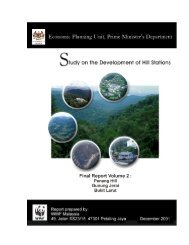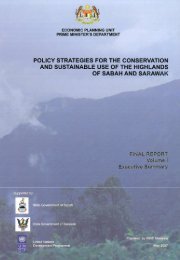FINAL VERSION FOR APPROVAL - Sdn Bhd - WWF Malaysia
FINAL VERSION FOR APPROVAL - Sdn Bhd - WWF Malaysia
FINAL VERSION FOR APPROVAL - Sdn Bhd - WWF Malaysia
You also want an ePaper? Increase the reach of your titles
YUMPU automatically turns print PDFs into web optimized ePapers that Google loves.
Gunung Stong State Park Preliminary Management Plan<br />
Unlike mass tourism sites, visitors to protected areas are generally not in the habit of buying<br />
souvenirs (except for the occasional T-shirt or key-chain); this could also be the reason why<br />
sales of souvenirs have not been encouraging. Nevertheless, basic training in operating small<br />
businesses is necessary, and must be an ongoing process among the local communities in<br />
areas surrounding GSSP. With basic training, the local communities will be encouraged to<br />
venture into any business that they feel is viable within the setting of the GSSP.<br />
6.19.4 Local Outdoor Recreation Club<br />
The boom in outdoor recreation is symptomatic of <strong>Malaysia</strong>’s greatly improved standard of<br />
living, with greater disposable incomes and more leisure time. This can be attested by the<br />
greater number of <strong>Malaysia</strong>ns visiting recreational forests, national parks and marine parks,<br />
the proliferation of outdoor clubs (public and in universities), the large number of outwardbound-type<br />
camps, publication of outdoor recreation magazines, and the proliferation of<br />
camping and fishing equipment shops.<br />
The recent introduction of the National Service programme will add to the number, as more<br />
<strong>Malaysia</strong>ns will be exposed to the outdoors. This will lead to greater pressure for the<br />
government to improve on environmental sustainability, and the establishment of more<br />
protected areas.<br />
The formation of a local outdoor recreation club should be encouraged as many outdoor<br />
recreation clubs have already visited GSSP. The local outdoor recreation club would be part<br />
of the local site support group (see section 6.20), especially if nature appreciation is<br />
incorporated into the activities of the club. Members of the club could be trained to become<br />
part-time guides, and hopefully be drawn away from negative activities such as drug abuse,<br />
vandalism and motorcycle racing.<br />
6.20 Local Site Support Group (SSG)<br />
A local Site Support Group (SSG) should be formed, comprising representatives of the<br />
following:<br />
(i) BAT and non-BAT guides.<br />
(ii)<br />
(iii)<br />
(iv)<br />
(v)<br />
(vi)<br />
(vii)<br />
(viii)<br />
Operators of homestays and souvenir stands.<br />
Operators of restaurants and coffee shops that directly benefit from tourism.<br />
Agro-tourism operators.<br />
School nature clubs.<br />
Outdoor recreation club.<br />
GSSP.<br />
KESEDAR.<br />
This well-represented and diversified group of local stakeholders, banding together under an<br />
umbrella group, will complement the programmes and operations of GSSP. The SSG should<br />
meet regularly, to discuss issues that are raised and participate in events and activities<br />
organised, such as trail clean-ups and climbathons, which will not only promote GSSP, but<br />
also provide positive identification of the group with GSSP. However, as a cautionary<br />
principle, the activities and events that are promoted should not be at the expense of<br />
conservation, which the primary purpose for the formation of GSSP.<br />
6.21 Promotion and Marketing<br />
As elaborated in Section 4.3, <strong>Malaysia</strong>ns make up about 80% of the visitors to GSSP, with<br />
those aged between 20 and 40 years, and males accounting for some 70% of the visitors.<br />
With most of them enjoying the outdoors, and participating in hiking and camping activities,<br />
102



